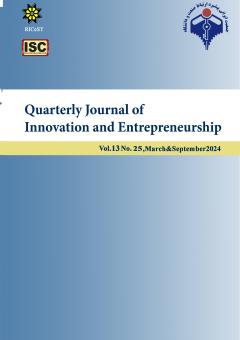Prioritizing Factors Affecting The Capacity of Tax revenues Arising From Intellectual Property Rights
Subject Areas : General
mahdi Azmoodeh
1
![]() ,
arash hadizadeh
2
*
,
arash hadizadeh
2
*
![]() ,
amir Mohammadzadeh
3
,
amir Mohammadzadeh
3
![]()
1 - Ph.D. student, Department of Management, Islamic Azad University, Qazvin branch, Qazvin, Iran
2 - Assistant Professor, Department of Economics, Qazvin Branch, Islamic Azad University, Qazvin, Iran
3 - Associate Professor, Department of Financial Management, Qazvin Branch, Islamic Azad University, Qazvin, Iran
Keywords: Tax Revenues, Intellectual Property rights, Tax Administration,
Abstract :
In Iran, the subject of taxation on intellectual property (IP) has not yet been introduced by the government or the Tax Administration. However, due to the significant volume of these assets in the Iranian economy and their trade and transactions, taxation on them is an inevitable necessity. As a result, the issue of taxation on intellectual property rights is being extensively discussed in academic and professional circles. Intellectual creations and social credits, such as inventions and trademarks, although difficult to create, are easily imitated, reproduced, and distributed with industrial and mechanical means. Consequently, the financial and economic benefits of intellectual property are often enjoyed by imitators and duplicators. Without proper support for creators, they may be unwilling to share their knowledge and assets. Therefore, intellectual property rights are recognized in most countries
1. احمدزاده. (1394). نقش نظام حقوق مالکیت فکری در توسعۀ اقتصاد دانش محور. فصلنامه نقد کتاب اطلاع رسانی و ارتباطات، 2(5)، 185-190.
2. آزموده، هادی زاده . و محمدزاده. (2022). شناسایی عوامل موثر بر ظرفیت درآمدهای مالیاتی ناشی از حقوق مالکیت معنوی با استفاده از نظریه داده بنیاد چندوجهی. مدیریت، 3(2)، 151-167.
3. پورابراهیمی، ابراهیم، نجات زادگان، سعید. و نجات زادگان، حمید. (1397). مدیریت داراییهای فکری و تبدیل مالکیت فکری به داراییهای منفعت ساز، موسسه داراییهای فکری و فناوری مدرس،کتابچه آموزشی ترویجی آشنایی باحقوق مالکیت فکری و ثبت اختراع، فصلنامه علمی- پژوهشی علوم اجتماعی ،45 -80.
4. حبیبا، سعید، و معتمدی، غلامحسین. (1385). حمایت از دانش سنتی به عنوان یکی از اجزای حقوق مالکیت فکری. مطالعات حقوق خصوصی (حقوق)، -(72)، 123-162.
5. عباسی، محمود؛ معین اسلام، محمد. و اکرمی، فروزان. (2016). جایگاه و چالشهای ایران در حمایت بینالمللی از حقوق مالکیت آثار ادبی و هنری. مجله علمی پژوهشی حقوق پزشکی، 9، 11-46.
6. Farazmand, H., & Baharvand Ahmadi, E. (2009). The Study of Factors Involved in the Tax Capacity of Lorestan Province. Journal of Tax Research, 16(3), 141-168.
7. Goolsbee, A. (1998). Taxes, organizational form, and the deadweight loss of the corporate income tax. Journal of Public Economics, 69(1), 143-152.
8. Griffith, R., Miller, H., & O'Connell, M. (2014). Ownership of intellectual property and corporate taxation. Journal of Public Economics, 112, 12-23.
9. Habiba, Saeed and Dareh-Shiri, Mahdia. (2014). Intellectual property income tax. Legal Research Quarterly, 18(69), 57-82.
10. Kanwar, S., & Evenson, R. (2003). Does intellectual property protection spur technological change?. Oxford Economic Papers, 55(2), 235-264.
11. Koštuříková, I., & Chobotová, M. (2014). New trends in intellectual property and tax burden of innovative corporations. Procedia-Social and Behavioral Sciences, 110, 93-102.
12. Maherkh Moghadam, Mojdeh, Majidi Kahrodi, Nasim, Mozafari, Afsana. (2019). Identifying factors affecting intellectual property rights in cyberspace. New Media Studies, 6(23), 259-284. doi: 10.22054/nms.2021.44138.772.
13. Merrill, P., Shanahan Jr, J. R., Gómez, J., Glon, G., Grocott, P., Lamers, A., ... & Linczer, A. (2012). Is it time for the United States to consider the patent box?. Tax Notes, 95, 1665-1675.
14. Nejadnouri, Mohammad Mehdi, Pour Ramadan Nargesi, Qasim, Haj Hosseini, Hojatullah, Sadri, Mohammad. (2017). The model of the intellectual property rights system of the Islamic Republic of Iran with the interpretive structural modeling approach. Interdisciplinary studظies of strategic knowledge, 8(32), 7-31.
15. Salmani, Mohammad. (2017). The right to access information and copyright in cyber space", scientific-research quarterly of medical law. 10 (5), pp. 7-35.
16. Schneider, P. H. (2005). International trade, economic growth and intellectual property rights: A panel data study of developed and developing countries. Journal of Development Economics, 78(2), 529-547.
16. Schneider, P. H. (2005). International trade, economic growth and intellectual property rights: A panel data study of developed and developing countries. Journal of Development Economics, 78(2), 529-547

